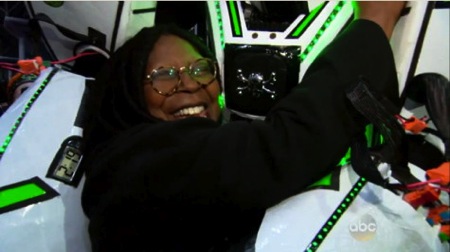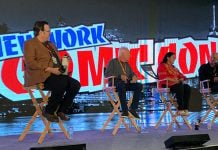Okay so Whoopi Goldberg did a segment at New York Comic-Con for THE VIEW and it includes not only Dan DiDio, but Joe Quesada, Kevin Smith, Diana Gabaldon, Frank Beddor and John Barrowman. Unsurprisingly, Quesada—who, like Whoopi, works for Disney—gets to be the straight man, but otherwise, considering that this is a video aimed at the demographic that traditionally has nothing to do with comics—stay at home moms and women over 25—I would judge this as the final triumph for comics culture.

What does the tribe think?








Still waiting for Whoopi’s guest appearance on The Big Bang Theory.
Oh good a sweet piece. Dan, DC and Jimmy will be so happy now! This is great for comics, industry awareness and stuff, a fun message too.
Great segment. Would have been even greater if someone had directed her north into Artists’ Alley.
The knee jerk reaction of how this would be bad for comics and such, is once again proven wrong. Judging before you see or experience something is always dangerous in just about anything.
How has it been proven wrong?
“The knee jerk reaction of how this would be bad for comics and such, is once again proven wrong.”
More Hollywood self-aggrandizement is somehow ‘good for comics’, when previous years of the same have already proven the opposite? Whoopi’s nerd bonafides might have been strengthened by this puffy segment, but that’s about all it accomplished. Stop with the unwarranted hubris already.
Palmiotti I thought you were a comic writer not DC’s new PR boy.
Whatever, How is this a DC thing? Did you watch the piece? I have books at DC, Marvel, Image, Jet City, and a couple of more places and say any attention that comics gets in the mainstream is great for all of us. Check the PBS specials running as well this week. My neighbor, a 7 year old, discovered the Avengers in the movies and now has his dad buy him comics all the time. I have to think these things open up discovery.
KET: I disagree. Walking dead as one great example . Hellboy as another.
ZACH: the other posting about Dan on the View was what I was addressing.
Again, how does this prove anything?
Jimmy so by “good” for comics you mean profitable. Just to be clear. Because I would hardly characterize 52 lenticular covers and the river of mediocrity that flows out of DC as “good” for comics. Let’s just give the rash of resignations / firings a pass. It’s good like American cheese is profitable but hardly good for anyone.
Good, as in exposure to comics. More people reading comics is good for comics, and not just the mainstream companies. Kids start off reading DC and Marvel because of cartoons and movies—great! Some, who fall in love with the medium, may remain readers of those companies their entire lives. Others’ll branch out and try other anything from Love and Rockets to webcomics to locally produced mini-comics. That’s good.
Isn’t the exposure only good if the comic is good? If my first exposure to comics was the new 52, I’d run away screaming.
Scott… Pathetic argument I enjoy IDW so that’s a plus. But you just said profitability in a backwards way. Beer is a wonderful thing and Americans have been developing a deeper appreciation for it but that doesn’t make Budweiser a good beer or a good company. Just because high-school students get drunk on Bud Light and then go on to drink Chimay as adults doesn’t absolve Budweiser from making swill. Garbage for the masses is still garbage for the masses just because you make money on it doesn’t make it good.
Wow. The old “I don’t like it, so it’s terrible” reasoning.
(Apologies to everyone…)
@whatever
Holy! Fucking! Shit!
Yeah? So some comics are mass produced, not that great, whatever, Whatever.
There are enough good comics (and a growing number of GREAT comics) being produced every month!
Here’s my example:
I got hooked on Spider-Man at a young age, because the local PBS station showed The Electric Company, and Spidey Super Stories helped me to read.
Yeah, people go back and laugh at the silly plots in those comics, but that got me hooked on superheroes, and helped me learn to read.
Years later, I discovered Spider-Man and Secret Wars (1984). I was trekking to the local shopping mall to get my weekly fix. Six months later, I was trekking through the snow to the local comics shop.
Eventually, I got bored with Marvel, and began reading DC, Eclipse, Dark Horse…
Many stores sell the mass-produced comics to keep their stores open so they can sell less popular titles.
Many publishers subsidize lesser titles and imprints by publishing mass-produced/popular fare (Fantagraphics’ Eros line).
Now, the rest of the country knows what we know… there are amazing comics for every age group. Libraries and schools stock them. Colleges teach them, and even award degrees!
You can either keep wallowing in the junk yard, complaining about the crap, or you can go and promote the stuff you like to others.
Skeptics react as they do, in large part because superhero comics fans buy them out of habit, engage in cosplay at conventions, and make adoration of superheroes part of their lifestyle. People who don’t read comics see those fans, think that they’re the face of comics, and never feel the need to investigate comics themselves. That might irritate fans of Ware, Clowes, Bagge, the Hernandez brothers, et al., but–
The comics format shouldn’t need evangelists. A good comics story shouldn’t require a reader to have a degree in the arts or special schooling to appreciate the artist’s technique. Literary fiction puts many people off because it’s not intended to be entertaining, per se; it’s meant to be aesthetically pleasing, to stimulate thought, to appeal to the intellect. Someone who writes literary fiction uses the same tools (words) as someone who writes a grade school primer, but he uses his tools more skillfully and to greater effect than the guy who writes the primer. Literary fiction is, in principle, as accessible as any formula fiction story, if someone wants to experience the writer’s work.
If art comix aren’t as accessible as prose works are, that’s to their detriment. If someone has to learn how to read art comix to enjoy them, that’s an acknowledgment that the audience for art comix generally is limited.
The accessibility gap between art comix and superhero comics might be greater than, say, the gap between superhero comics and prose fiction. If that’s the case, then fans of art comix might spare themselves considerable frustration and irritation by acknowledging that art comix aren’t for everyone and aren’t intended to be. Enthusiasm for artistry isn’t transferable in the way that comics evangelists would like it to be.
Superhero comics actually are accessible, but many of them are also written poorly, sometimes even drawn poorly. They could be written and drawn better without losing any accessibility–but would there be a market for them? The success of SAGA suggests there might be.
Rather than spending energy on evangelizing the comics format and damning superhero comics for existing, people might be better off hoping that comics creators and their publishers find the right balance between artistry and accessibility, and that people who enjoy SAGA, the WALKING DEAD comics, or the Twilight adaptation will try other comics without any urging.
SRS
I guess it wasn’t bad, but I don’t believe it does anything for the industry or the actual art form that is comics. The movies have already raised awareness beyond anything The View could do. I’m glad Goldberg showed up. I want everyone to be welcome at conventions and she seems to be an honest fan of the medium, so it’s nice that she wanted to do a piece on the show. On the rare occasions that I’ve watch the view, it usually makes me angry, because it seems to me to be a pretty consistent brow beating of it’s audience, into whatever shapes the hosts deem good, experts that they are on everything that crosses their desks, but this time I didn’t feel that way, so that’s good. (I feel that way about pretty much all media, so take that with a grain of salt.) What I want to know is, how do we actually promote good comics as the wonderful medium that they are, rather than “geek culture”? Yes, media sees that we do all this wonderful stuff, but we seldom get to show what’s actually driving it. When the view does a piece on the brilliance of Alan Moore or Alex Ross, then I’ll really want to tune in.
Torsten – What a wonderful argument for mediocrity. How blessed the comics industry is to be represented by Dan Didio and the general garbage that superhero comics represent.
I haven’t been able to stomach Whoopi Goldberg since her defense of Roman Polanski with “it wasn’t rape, rape.”
But she’s a celebrity who noticed comics. Whatev.
Torsten,
I thought you make a wonderful argument PERIOD. Of course, it’s too bad that it had to be an argument…
Whatever: I found a couch in a dumpster once — WHAT NOW?!
Jonny R – Eat couch. Easy question.
I thought it was a pretty decent segment that celebrates the con experience and culture. Whoopi could have easily interviewed a bunch of tools like the snarky bunch (who are posting responses here) but instead, she opted to talk with a bunch of people who love and celebrate comics.
And what’s so bad about that?
If it doesnt suit you, then go crawl back into your hole.
Wow so serious Shableski? Aren’t these the same snarky readers you try and sell TPBs too? It’s not just about loving and celebrating comics is it? It’s a little bit about your paycheck right? A little?
Comments are closed.